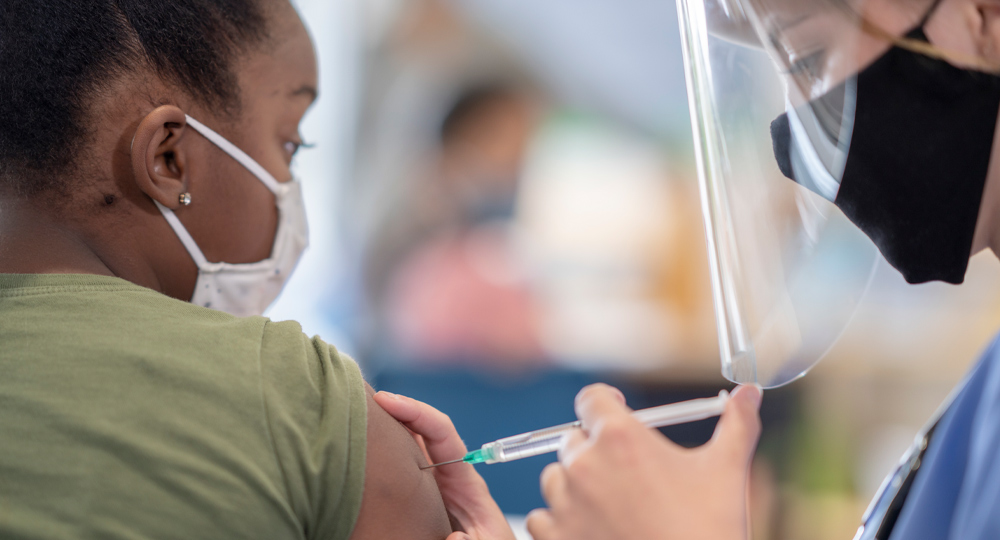
Generally, states have the authority to mandate and enforce compulsory vaccine laws (Jacobson v. Commonwealth of Massachusetts (1905) 25 S.Ct. 358), and California currently mandates a series of vaccines for students to attend school. California’s Health and Safety Code section 120335 requires districts to ensure that students are immunized against specified diseases prior to their enrollment in school and before advancing to grade 7. Under the law, a student must present evidence of immunization against measles, mumps, rubella, diphtheria, tetanus, pertussis (whooping cough), poliomyelitis (polio), hepatitis B, varicella (chickenpox) and haemophilus influenza type b (Hib meningitis), in accordance with the age/grade of the student, as required by the California Department of Public Health. Critically, the law also authorizes CDPH to require immunization against any other disease it deems appropriate.
Though California has not yet indicated if it plans to mandate the COVID-19 vaccine for students, there are a number of options available to do so, including by using CDPH’s authority under Health and Safety Code section 120335, passing new legislation to mandate COVID-19 vaccines for K-12 students, or by an executive order issued by the Governor.
Perhaps one reason the state has not given executive, legislative or administrative guidance on this is because a COVID-19 vaccine has not been approved for most K-12 school-age children. The Pfizer coronavirus vaccine is currently only authorized for people 16 and older, and the Moderna coronavirus vaccine is currently only authorized for people 18 years and older. The clinical trials conducted in 2020 studied the COVID-19 vaccine’s safety and efficacy only on adults, and additional studies are needed on how the vaccine will affect children. This process is expected to take at least several months.
In the absence of a state mandate requiring a COVID-19 vaccine for students, the question arises as to whether a governing board can on its own mandate COVID-19 vaccines for its students.
While school districts have general authority to ensure their campuses are safe, and the statutory authority to exclude any student with a contagious or infectious disease from school attendance (see Education Code section 49451), it is unclear at this time whether a school district may require its students to be vaccinated against COVID-19 absent authorization from CDPH or their local health department. Even as some school leaders may face pressure to mandate COVID-19 vaccines for their students before allowing them to return to on-campus learning, locally mandating a COVID-19 vaccine for students will likely provoke legal challenges and/or public resistance. These will largely be fueled by unresolved questions about the severity of COVID-19 symptoms in children, the novelty of the vaccine and other safety considerations. Legal challenges to the authority of a school district or county office of education to mandate the vaccine for its students is a given, especially in light of how requiring the vaccination would impact parents’ compliance with state law that requires all children 6–18 years old, with certain exceptions, to attend school. As such, school leaders will have a lot to consider when vaccines are available to students.
When a vaccine is eventually approved for children, school boards should look to CDPH and to their local health officials/departments for guidance on COVID-19 vaccine-related policies. In its Jan. 14, 2021 COVID-19 guidance, CDPH strongly recommends that all persons eligible to receive COVID-19 vaccines receive them at the first opportunity, but notes people under 16 are not eligible for the vaccine since trials for that group are still underway. Because vaccine implementation for schools is rapidly evolving, CDPH provides a separate vaccine guidance document that will be available on the Safe Schools for All Hub. Whenever vaccines are approved for children under the age of 16, it is anticipated that CDPH will provide additional guidance to schools.
Even with the uncertainties around vaccination of the student population, school districts still have an array of disease control and mitigation strategies to fall back on in preventing transmission in schools, including masks, physical distancing, educating students in small cohorts, hand hygiene, ventilation, screening for symptoms or close contact and asymptomatic testing, as detailed in the CSBA sample policy BP 0470 – COVID-19 Mitigation Plan.
Please note that the information provided here by CSBA is for informational purposes and is not legal advice. Please contact your district or county office of education’s legal counsel for legal questions related to this information.